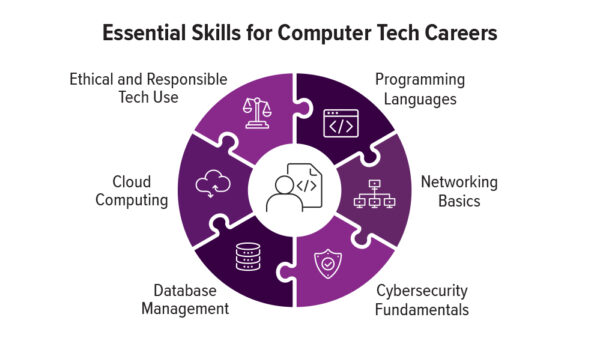Why Your Career in Computer Technology Starts with an Associate Degree

Employment in computer technology careers is expected to grow faster than the average over the next decade, offering not just jobs, but resilient and purpose-driven vocations. If you’re considering a new career path, whether you’re just starting out or looking to shift to something more future-focused, computer technology is worth a serious look. From solving everyday tech problems to helping secure vital systems, this field touches nearly every industry, offering opportunities to grow, specialize, and make a meaningful difference.
Whether you’re brand new to IT or transitioning from another field, an associate degree in computer technology gives you a solid foundation. It helps you acquire the skills employers need today while preparing you for future learning and advancement in the fields of information technology and computer science.
Why Start with an Associate Degree in Computer Technologies?
An associate degree in computer technologies is more than just training in tech; it’s a practical starting point for a wide range of careers, from cybersecurity and health care IT to data analytics. Today’s programs are built with input from industry leaders and aligned with in-demand skills, so you’re not just learning what’s current—you’re learning what’s relevant.
But technical skills aren’t the whole picture. Today’s tech professionals are also expected to think critically about the ethical and social impacts of their work. Understanding topics like AI bias, data privacy, and responsible system design is becoming just as important as knowing how to write code or configure a network.
Associate Degree in Computer Technology vs. Boot Camp
Coding boot camps can be fast and focused, but they often leave out the broader understanding that helps professionals adapt and grow over time. An associate degree provides a deeper, more balanced approach. You’ll build technical knowledge and critical thinking skills. Plus, a degree often carries more weight with employers and can open doors to promotions or certifications down the line.
Associate vs. Bachelor’s
A bachelor’s degree offers a wider range of opportunities, especially at the midcareer level, but starting with an associate degree helps you get working faster. In many cases, you can finish in under two years, start earning income, and then continue your education with a clear path forward. Many associate programs are designed with transfer in mind, so your credits can count toward a bachelor’s degree later on.
Computer Technology Jobs You Can Get with an Associate Degree
There’s no one-size-fits-all path in tech, and that’s a good thing. With an associate degree, you can pursue entry-level roles that let you build experience, explore specialties in information technology or computer science, and grow into more advanced positions.
Some common roles include:
Computer service technician. In this role, you would help diagnose and repair hardware and software issues in desktops, laptops, and mobile devices. These professionals often work directly with users to troubleshoot problems, replace components, and keep systems running smoothly.
Software technician. The primary duties of software technicians include assisting with installing, configuring, and maintaining software across devices or departments. In this role, you would support software updates, manage compatibility issues, and help ensure systems stay up to date and secure.
Computer specialist. In this role, you would provide general IT support across systems, software, and devices. In addition, you may manage user accounts, support equipment setup, or help troubleshoot a wide range of tech issues for individuals or teams.
Technical support analyst. These tech professionals troubleshoot more complex issues involving software, hardware, and networks. This role often involves remote support, ticketing systems, and diagnostic tools to resolve problems efficiently and keep systems online.
Network support technician. In this role, you would maintain secure and reliable networks for businesses, schools, or nonprofit organizations. Your responsibilities might include setting up routers, monitoring network performance, or assisting with cybersecurity basics like firewalls and access controls.
6 Key Skills You’ll Need for a Career in Computer Technology

The field of computer technology calls for more than just knowing how to code. The following six skills are essential to getting started and growing in a tech career:
Programming languages. Learning languages like Python or Java helps you understand how software works and how to make computers do what you want them to do.
Networking basics. Knowing how data moves and how systems connect is core to most IT roles.
Cybersecurity fundamentals. With so much at stake, being able to identify and fix security risks is a critical part of almost any tech job.
Database management. From customer information to internal records, nearly every business runs on data. Understanding how it’s stored and accessed is a valuable skill.
Cloud computing. Today’s systems increasingly run in the cloud. Knowing how to work with platforms like AWS or Azure helps you stay current.
Ethical and responsible tech use. Good tech work means thinking beyond the screen. Can users trust the system you built? Is it fair? Is it secure? These questions matter, and students who can engage with them thoughtfully stand out. Whether you’re building a network for a school district or configuring cloud services for a hospital, understanding the broader impact of privacy, accessibility, and fairness, as well as your technical choices, makes you a more thoughtful and trusted professional.
Why Start Your Career in Computer Technology with Excelsior University?
Excelsior University’s AAS in Computer Technologies program is designed for working adults and career changers who require flexibility without compromising on quality. You’ll get real-world scenarios, hands-on practice, and a program built around the skills employers care about.
Even better—this associate degree isn’t a dead end. It’s a direct pathway into Excelsior’s bachelor’s program in information technology, cybersecurity, or computer science. Your credits transfer seamlessly, so when you’re ready to take the next step, you won’t have to start over. You can keep building on what you’ve already accomplished.
Additionally, new tuition scholarships can reduce the program’s cost to as little as $350 per credit, making it one of the more affordable, high-quality options available. And you may be eligible to receive credit for specific industry certifications, like some offered through our partner MedCerts, which can help you gain workforce skills and earn your degree sooner.
Ready to Take the First Step?
Whether you’re returning to school, switching to a career in computer technology, or just starting out, Excelsior’s associate degree in computer tech gives you the tools and the support to take your next step with confidence. Explore the AAS in Computer Technologies program or reach out to one of our friendly admissions counselors with your questions.



